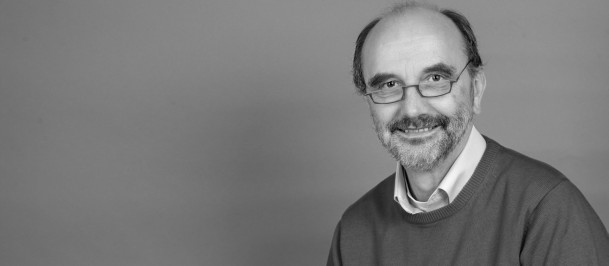Thinking in Systems
Making the most out of a minimum of resources – systems thinking will get you very close to this goal. That’s what Karl-Josef Schalz is convinced of. And the expert for precision mechanical engineering knows exactly what he is talking about.
Doing research about adaptronics in rural Weilburg an der Lahn seems odd. But sometimes, knowledge can be found where one wouldn’t exactly expect it. As is the case with Professor Dr. Karl-Josef Schalz. After 24 years at the faculty of engineering science at HAWK Göttingen, the University of Applied Sciences and Arts, the retired professor went back to his hometown. Although: He was never quite gone. In 2010, he founded his company Schalz Adaptronic in Weilburg. With him being at the interface of science and industry, the expert knowledge of the mechanical engineer is sought after as it has provided valuable impulses.
Optimum of the whole system instead of maximum specifications
What makes the expert for precision mechanical engineering stand out in particular? Well, he has always been a man of practice. After his training as a drafter with a technical diploma, Karl-Josef Schalz studied mechanical engineering in Kaiserslautern, first at the University of Applied Science and then at the University where he obtained his doctorate. In 1986, he went to work for Ernst Leitz Wetzlar where he delved into the deeper dimensions of metrology: “In the first three years, I was in charge of designing coordinate measurement methods as a developer. My job was to simulate machinery and to dimension machines before a specification was created.” There followed another eight years in microscopy, from 1990 as chief manager of design and electronics, and finally as chief innovation manager for the specialty departments electronics, mechanics, and software.
At Leitz, Karl-Josef Schalz brought designing and developing precision machinery to perfection – that applies in equal measure to metrology, biological microscopy, and the upcoming semiconductor microscopy. “It was exceptional that the chief developer was not only responsible for the development of the product but also for the manufacturing costs”, Schalz recalls: “This meant, for one thing, that when designing a machine, I always had to keep one eye on costs and benefits, on expenditure and revenue. And for another, I realized that efficiency and performance of a machine do not necessarily depend on maximum specifications but should rather be geared towards the optimum of the whole system. That’s a mentality which I have internalized. And it is important. Also, and above all, for a product to be successful.”
The secrets and the impacts of adaptronics
This is exactly where adaptronics sets in: Taking into account the functional principles of mechanics, electronics and control engineering, it aims at optimizing the system through simulation, modeling, and competent layout. In cooperation with company Busch Microsystems of Langenlosheim, Karl-Josef Schalz has demonstrated how this works: “Measuring a component to 1/1000 of a hairsbreadth is nearly impossible or the technology would be so costly that it is hardly economically feasible. Based on the functional principle of dynamic error compensation, we succeeded in developing an ultra-precision machine with the ability to do so by compensating residual errors in real time.”
So, the secret of adaptronics is down to the system – and the impacts are obvious: making the most out of a minimum of resources. “If I comprehend the system and combine it skillfully”, Karl-Josef Schalz explains, “I’ll be able to construct machines which are, for instance, much lighter. In optics and precision mechanics, on the other hand, where every hundredth of tolerance in production becomes exponentially more costly, the appropriate system will provide the means for effective countermeasures.” This is not only more profitable but will also save resources and will thus be more sustainable in the end.
Potentials of machine dynamic and structural mechanical design
Designing a machine with regard to optimizing it in dynamic, mechanic and structural respects unlocks enormous potential for the industry. And the knowledge which enables systems thinking Karl-Josef Schalz to do so is remarkable. This semester, he shares his knowledge with students, starting as a lecturer for the modular unit “Design/Machine Elements” within the framework of the study program StudiumPlus at the University of Applied Sciences Mittelhessen. At the same time, he still keeps an eye on the big picture. It doesn’t matter if it is about optics or precision mechanics, micro- or macrostructures, small enterprises or the industrial location Germany.
“What is the use in trying to improve individual performance characteristics or specification details to remain competitive? The system is where we need to be effective in”, says Karl-Josef Schalz when we make our farewells. This assessment merits more than a furtive thought. It’s occupying our minds for quite a while after we have left the place-name sign of Weilburg behind.
